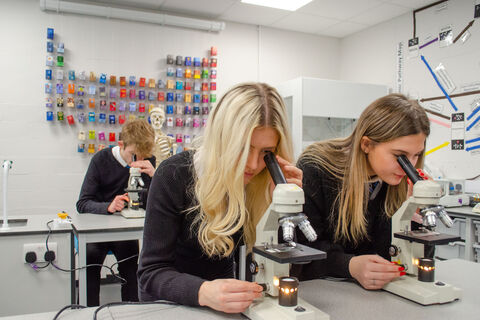

The Science department has seven large laboratories and two smaller ones. From year 7, pupils study Science and gain experience in practical skills as well as scientific theory. The most important things to bring to a Science lesson are an open mind, the willingness to think and the ability to learn from mistakes. The principles of the Curriculum for Wales underpin the study of Science throughout the school. We encourage students to become informed about issues concerning Science and technology, both in Wales and the wider world and how this may affect their lives. We would like them to become ambitious and capable learners who are curious about the world around them and who will leave school capable of living independent and fulfilling lives.
Through school Science, we hope that pupils will build up a repertoire of knowledge and skills that will equip them to understand Science in the media, scientific principles in the careers they aspire to and, for some, the desire to study Science in depth after school and become the trailblazers of the future.
There are 9 Science teachers who have a wide range of experience in the scientific field. We are all Science enthusiasts who love to discuss science and its applications in the wider world.
Dr D Barnett
Head of Department, Teacher of Science (Biology)
Mr D Wilkins
Second in Charge, Teacher of Science (Physics)
Mr D Barnett
Teacher of Science (Chemistry and Medical Science)
Ms E Clampitt
Teacher of Science (Biology)
Mr A Clowser
Teacher of Science (Physics)
Mrs L O’Rourke
Teacher of Science (Chemistry)
Ms K Webb
Teacher of Science (Biology and Medical Science)
Pupils experience Science through a program of study designed to develop scientific skills and engage them in questioning and curiosity about the world around them. They are continually assessed for their knowledge and understanding of Science and their use of literacy, numeracy and digital competency.
We encourage curiosity and pupils are able to express themselves in a variety of ways. Practical skills are developed at every opportunity and pupils are encouraged to work in groups and use their communication skills in order to develop the teamwork required throughout life.
We expect pupils to have an open mind, be willing to challenge pre-existing ideas, be prepared to learn from their mistakes, show consideration for others opinions and contribute towards class discussion. We expect them to cooperate with other students and teachers in order to learn effectively.
We offer two courses at GCSE, both are WJEC courses, there is a link to related resources below. GCSE Sciences equip students with skills relevant to modern life and allow them to make informed decisions about issues affecting them directly and indirectly. Thinking skills are fundamental to the study of Science and we ask that students demonstrate a resilience to challenge when the answers are not obvious.
GCSE Double Award Science:
Most students take this course. It is a two-year course, which includes nine lessons a fortnight, three each of Biology, Chemistry and Physics, taught separately. There are three exams in year 10 as well as a practical exam and three more exams in year 11. The exams are available at foundation and higher tier. The result is two GCSE grades from A*A* to GG.
GCSE Single Award Applied Science:
Some students take this course as a vocational route, they also often do college courses and this course provides a more suitable option with the available time, they will have six Science lessons a fortnight. They complete once exam in year 10 and once in year 11. There is a practical task-based assessment in November of year 11 and a practical exam in January of year 11. The result is a GCSE grade from A* to G.
We offer four courses in the sixth form. Practical work is integral to the study of Science and the school has a new laboratory exclusively for 6th form Sciences.
AS/A2 Biology explores the major principles and processes of life. It will include cell biology, biochemistry, variation, evolution, inheritance and a study of the environment. There will be aspects of human biology, plant biology and the fascinating world of microorganisms.
AS/A2 Chemistry, the science that underpins how everything around us works at a fundamental level. Chemical analysis at a qualitative and quantitative level will be perfected through extensive practical practice.
AS/A2 Physics is about understanding everyday phenomena like rainbows, red sunsets and blue skies as well as quantum theory, relativity and cosmology.
L3 Certificate/Diploma in Medical Science, this is the Science of dealing with the maintenance of health and the prevention of disease. This course is designed for learners considering a career related to healthcare.
Studying Science is essential for a wide range of careers in addition to the obvious ones.
Astronomer, Agriculturalist, Botanist, Biologist, Chemist, Doctor, Pharmacist, Physiotherapist, Nurse, Vet, Physicist, Engineer, Geneticist, Nutritionist, Geologist, Archaeologist, Geophysicist, Pharmacologist, Forester, Pathologist, Radiologist, Volcanologist, etc.
Some of the careers that require a knowledge and understanding of some scientific principles are:
Mechanic, Electrician, Hairdresser, Chef, Butcher, Baker, Carpenter, Builder, Plumber
WJEC - select subject and level for a variety of resources
https://www.wjec.co.uk/home/student-support/revision-resources/new-blended-learning/
Revision Guide recommended for Double Award Science GCSE: WJEC GCSE Science Double Award
For recommended sixth form texts consult staff delivering courses.
For any other enquiries email Dr D Barnett (Head of Science).